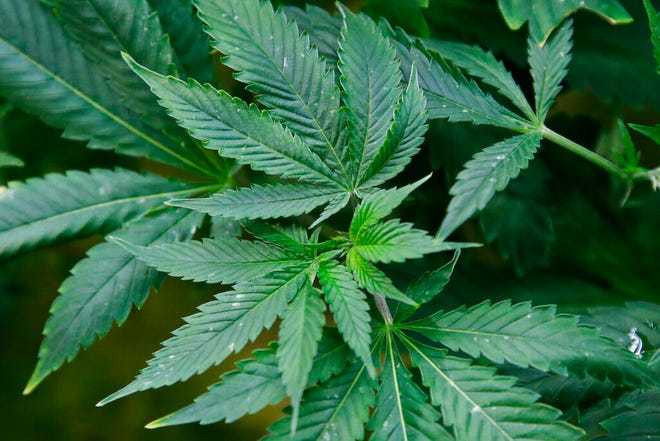
Nearly half of new coronavirus infections nationwide are in just five states – a situation that is putting pressure on the federal government to consider changing how it distributes vaccines by sending more doses to hot spots.
New York, Michigan, Florida, Pennsylvania and New Jersey together reported 44% of the nation’s new COVID-19 infections, or nearly 197,500 new cases, in the latest available seven-day period, according to state health agency data compiled by Johns Hopkins University.
The heavy concentration of new cases in states that account for 22% of the U.S. population has prompted some experts and elected officials to call for President Joe Biden’s administration to ship additional vaccine doses to those places. So far, the White House has shown no signs of shifting from its policy of dividing vaccine doses among states based on population.
Also in the news:
►A coronavirus variant first identified in Britain is now the most common strain of coronavirus circulating in the U.S. The director of the Centers for Disease Control and Prevention, Dr. Rochelle Walensky, said Wednesday that the strain, formally known as B.1.1.7, is “now the most common lineage circulating in United States.”
►The European Union’s drug regulator says it has found a “possible link” between the AstraZeneca coronavirus vaccine and a rare clotting disorder but said that the benefits of the shot still outweigh risks. In a statement released Wednesday, the European Medicines Agency placed no new restrictions on using the vaccine in people 18 and over.
►A third of COVID patients in a study of more than 230,000 mostly Americans were diagnosed with a brain or psychiatric disorder within six months, scientists reported in the journal Lancet. Among patients who required treatment in ICU units, more than 4 in 10 suffered disorders, the researchers found.
►California plans to drop its tier system and open up the state June 15 if vaccine supply remains steady and coronavirus metrics continue to decline. Everyday activities will be allowed and businesses will open with "common-sense risk-reduction measures," state Health and Human Services Secretary Dr. Mark Ghaly said.
►Not a single oceangoing cruise ship has departed with passengers from a U.S. port in the past year. But that's changing. Norwegian Cruise Line announced Tuesday that it's planning its official return to service for late July with sailings in Europe and the Caribbean – but passengers and crew will be required to be "100% vaccinated" two weeks before boarding.
? Today's numbers: The U.S. has more than 30.8 million confirmed coronavirus cases and 556,000 deaths, according to Johns Hopkins University data. The global totals: More than 132 million cases and 2.8 million deaths. At least 219 million vaccine doses have been distributed in the U.S. and 168 million have been administered, according to the CDC.
? What we're reading: Why do children fare better than adults against COVID-19? Their innate immune response may stop the virus earlier, according to a new study. Read the full story.
USA TODAY is tracking COVID-19 news. Keep refreshing this page for the latest updates. Want more? Sign up for our Coronavirus Watch newsletter for updates to your inbox and join our Facebook group.
Some colleges will require vaccines this fall
The class of 2025 entering college this fall could have a new prerequisite: Getting vaccinated against COVID-19. Rutgers University in New Jersey and Cornell University in upstate New York were among the first universities to announce that their students would be required to be vaccinated if they wanted to study in-person during the fall semester. Brown in Rhode Island, Northeastern in Boston, Nova Southeastern University in Florida and Fort Lewis College in Colorado have all announced similar policies. More schools likely will join the list.
“It doesn’t just make us safer. In the end, it makes our entire community safer," said Antonio Calcado, Rutger's chief operating officer. "That’s why we think requiring is the way to go versus encouraging.”
– Chris Quintana
Itchy rash after your vaccine jab? You'll be fine, expert says
Getting COVID-19 can cause all manner of odd skin reactions. A new study finds some of them can be rare, brief side effects of getting the Pfizer-BioNTech or Moderna vaccines. The itchy and annoying reactions were seen in a database of 414 cases of delayed skin problems linked to the vaccines and reported to health care professionals. The cases were collected between December and February before the Johnson & Johnson vaccine had been authorized, so it was not included. None caused a life-threatening reaction, a finding the study's senior author Dr. Esther Freeman found reassuring. Read more here.
“People can get full-body rashes, and that can be surprising and a little scary, but these patients did extremely well, recovered and were able to go back and get their second dose,” said Freeman, director of global health dermatology at Massachusetts General Hospital.
– Elizabeth Weise
Asian Americans among most affected by pandemic shutdowns
Asian Americans and Pacific Islanders are grappling with the nation's highest rates of long-term unemployment more than a year after the pandemic shuttered hotels, restaurants, shopping centers, beauty salons and other sectors of the economy. Even as unemployment levels driven by the economic shutdown have returned to near pre-pandemic levels, many Asian Americans are unsure when they will be able to return to work.
According to the Bureau of Labor Statistics, 48% of the Asian community’s estimated 615,000 unemployed had been without work for six months-plus through the first quarter of this year. The figure surpassed long-term unemployed among jobless workers in the Black population (43%), white population (39%) and Hispanic population (39%).
– Marc Ramirez
Tech officials 'Apollo 13-ing' vaccination scheduling programs
Local health officials faced with the daunting duty of vaccinating their corner of America have had to piece together an information technology systems in the face of unstable vaccine supply and strained staff and resources. Though the federal government spent millions on vaccine scheduling and supply management programs, it was of little use to local officials, who scrambled to come up with systems on their own.
Becky Colwell-Ongenae, geographical information system manager for Will County, Illinois, said she feels like tech experts are "Apollo 13-ing this vaccine rollout," a reference to the 1970 space flight during which makeshift engineering averted near disaster when an oxygen tank failed. “I got a plastic bag and some tweezers, and I gotta moonshot home,” she said. Read more here.
– Aleszu Bajak and Elizabeth Weise
US behind other nations in crucial tracking of variants
The United States lags well behind many other countries in employing the essential tool for keeping abreast of variants – gene sequencing – increasing the risk that a new variant could spread undetected here. Sequencing involves taking samples from positive tests to another lab for sequencing, providing the genetic code of a virus and laying out for scientists a precise map for how to defeat it.
So far this year, the U.S. ranks 33rd in the world for its rate of sequencing, falling between Burkina Faso and Zimbabwe, according to COVID CoV Genomic, led by researchers at Harvard and MIT. The top three nations – Iceland, Australia and New Zealand – sequenced at a rate between 55 and 95 times greater.
– David Heath
About 80% of teachers, child care workers vaccinated
About 80% of teachers, school staff and child care workers have gotten at least their first COVID-19 vaccine shot, according to the Centers for Disease Control and Prevention. The percentage came from a CDC survey completed by 13,000 education staff and 40,000 childcare workers across the country. The CDC said it had tracked more than 7 million doses that had been administered to the group, which were prioritized in early March in hopes of reopening schools across the U.S.
"Our push to ensure that teachers, school staff, and child care workers were vaccinated during March has paid off and paved the way for safer in-person learning," CDC Director Rochelle Walensky said. "CDC will build on the success of this program and work with our partners to continue expanding our vaccination efforts, as we work to ensure confidence in COVID-19 vaccines."
Brazil, Argentina break records for deaths, infections
Both Brazil and Argentina broke their own bleak records with COVID-19 infections and deaths as the rest of the globe continues its race to vaccinate as more variants spread. Brazil – where the more infectious P.1 variant was discovered – saw its deadliest day on record on Tuesday with 4,195 deaths within a 24-hour span. More than 330,000 people have died in the country because of COVID-19.
Argentina also broke its record for infections, recording 20,870 new COVID-19 cases in one day. The total number of confirmed cases in the country are more than 2.4 million.
Contributing: The Associated Press
Source link








